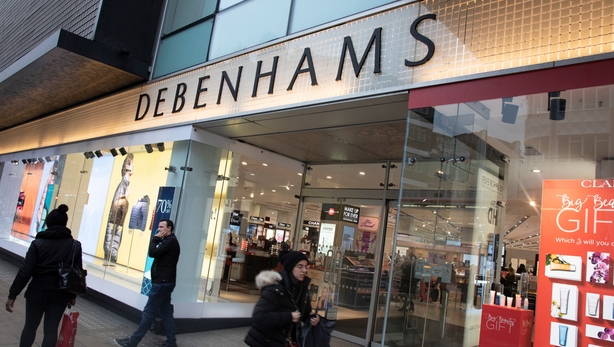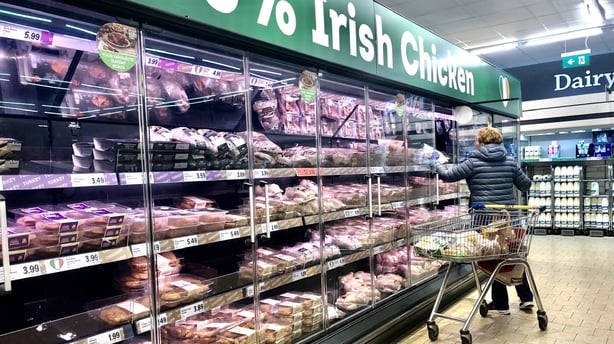Covid-19 has transformed large swathes of the economy in remarkable and generally not very positive ways.
Pretty much every sector is having to do things differently, as staff toil from home, those who are in work practice social distancing, supply chains are disrupted and demand falls off a cliff.
But few areas of the economy are experiencing bigger levels of shock and upset than retail.
And when the virus is finally banished from our shores and things return to a new normal, there are a number of ways in which retail will probably be changed utterly, and forever.
Loss of many retailers
On Thursday, Debenhams announced that it expected that the administrator appointed to its UK operations would appoint a liquidator to its Irish business.
As a result, it said the majority of its 11 stores here are not expected to reopen after the Covid-19 movement restrictions are lifted.
Debenhams has not been without difficulties in recent years. Its UK parent has been in administration twice in the last year.
Its Irish operations exited examinership in 2016 after renegotiating costs, including its commercial rent agreements down to a more sustainable level.
But despite the challenges it was already facing, the Covid-19 crisis proved a shock too many, claiming what is the first high-profile casualty of the economic emergency.
It may be the first, but it certainly won’t be the last retailer to go this way as a result of the situation we currently find ourselves in.
Many others were undoubtedly teetering on the brink before the coronavirus pandemic took off and they will do well to survive.
Unfortunately there will be plenty of others who will have entered this period of profound tumult in reasonable shape, but simply won’t have the working capital, the experience or the resolve to emerge from it on the other side.
Growing operating costs such as rent, rates, insurance and staffing, the threat from online retailers, many of whom are based outside the country, and changing shopping habits are all putting pressure on traditional retailers’ models.

On Thursday, Retail Ireland said the Debenhams closure reflected the pressure on vast swathes of the retail sector at this time.
It warned that without additional government supports, such as a commercial rates exemption and action on rents, many more businesses that are closed temporarily will not reopen and many thousands of jobs will be lost.
But even if there is further action to help retailers, the sad fact is that when the crisis is over many outlets simply won’t re-emerge, and large numbers of the 200,000 jobs in the sector will be gone.
Online surge
While traditional bricks and mortar retailers are suffering incalculable losses, those who have an online presence are well placed to benefit, or at very least do enough business to keep staff on the books and survive.
Many small businesses who don’t currently have an e-commerce offering are scrambling to get themselves an online shop front for the first time.
Thankfully, there are plenty of supports there to help, from practical advice from organisations like the E-Commerce Association of Ireland Taskforce, to the additional financial supports on offer from Government to help firms get the infrastructure and know-how in place.
But this first time push online by many outlets and small firms will only be one side of the equation.
Huge numbers of people who have avoided or only dabbled in online shopping in the past are now buying on the internet.
Data released by digital marketing agency Wolfgang Digital over the past two weeks attests to the changes.
Between 30 March and 5 April, internet-based sales traffic rose overall by 19% in Ireland compared to the period prior to the coronavirus pandemic reaching these shores.
This represents the largest volume of online shopping traffic growth seen over the last nine weeks and an increase of 10% on a week earlier.
The activity is not only being driven by existing online shoppers, but also first time visitors to particular websites, with the share of new traffic up 4% last week compared to the previous seven days.

And so, when the crisis eventually ends, how many of those people will return to their old shopping habits of browsing and buying in store, and what quantity will continue their new trend of buying via their phone, tablet or PC?
Without question, the pace of change away from traditional shopping norms will be accelerated by the crisis and a reversal afterwards seems unlikely.
Buying local
Though Covid-19 will have a devastating impact on many retailers, it perhaps isn’t all bad news.
In small towns and villages around the country, people who would have in the past increasingly focused their buying habits on large multiples will have suddenly re-discovered the importance of shopping and supporting local.
The home delivery services of large supermarkets, for example, are bursting at the seams, with customers having to book slots up to two weeks ahead of time to get one.
Enter the local butcher, greengrocer, corner shop or book store, who in increasing numbers are offering curb-side drop services for daily essentials.
Such developments are not only keeping many retailers afloat, but may strengthen loyalties to local outlets in a way that endures once the crisis ends.
And that could prove beneficial for many small local retailers who will need support to stay afloat.
The other side to all this is that the pandemic has given rise to quite severe disruption to international supply chains.
Those shopping in supermarkets in recent weeks will have noticed lower than normal or non-existent availability of certain goods they usually buy that come from abroad.
The knock-on effect of this is that in many cases retailers and their customers have been forced to look to local suppliers and their products.
This has led to the realisation that the quality and price of what we produce right here on our own doorstep is as good if not better in many cases than what we import from abroad.
Again, this has and could could to have a more positive effect for the domestic retail economy when the situation settles.
Respect for retailers
We take so much for granted in life. Things that are always just there, just work, just happen.
But the Covid-19 situation has shone a light on many of these sectors and services, and given us a new found appreciation for them and those who work in them.
Among them is retail, retailers and their staff.

We need them now more than ever before, particularly those selling essential products like food and drink and prescription drugs.
And we need to recognise that those working in the retail front line are putting themselves at risk in doing so, while also going to huge effort to ensure we remain fed and can get our medicine.
No amount of social distancing measures in shops, hand sanitiser or anti-bacterial wipes can completely eliminate the danger that those working in retail right now are being exposed to.
It is right then that just like we have saluted our frontline healthcare workers, that we also recognise the valuable role being played by those manning checkouts and stocking shelves.
And when this is all over, hopefully retailers and their staff will continue to be held in high regard for the lengths they have gone to.
Do we need so much stuff?
The final way in which the Covid-19 emergency could change the retail landscape is a little more philosophical and thoughtful.
The pandemic has been and continues to be a frightening experience for all of us, particularly for older and vulnerable people, those who care for them and those who have had the illness.
For a great many people, this threat coupled with the prolonged period of time we have been stuck at home, has caused us to take a look at our lives and what is actually really important to us.
It has also led many of us to clean out attics, cupboards, sheds and wardrobes that were full of unwanted or unneeded material items.
Will many of us therefore come out the other side realising that life, love and friendship are far more important than stuff?
Will we re-evaluate our voracious consumer demand, our desire to have the latest and best of everything?
Could this translate into us buying less, unless we actually need it?
Of course, with more than 700,000 people currently in receipt of State income supports having been laid off due to the Covid-19 crisis, large numbers of people will also not be in a financial position to go on spending sprees when the dust settles.
For them, making ends meet will be the single most important issue that has to be met.
All of this could have a profound impact on our shopping habits into the future, changing the retail landscape forever.







